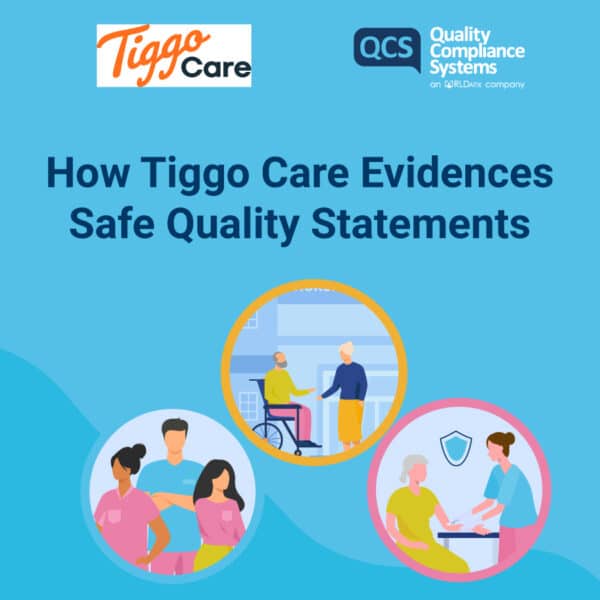Find out about how Tiggo Care evidences CQC’s safe quality statements as part of providing a high standard of home care.CQC’s quality statements are the commitments that we, as care providers, must follow.
At Tiggo Care, we take our responsibilities to our clients, families and colleagues very seriously. We want to provide a high standard of home care and ensure that everyone we support is safe.
CQC’s quality statements are divided into five sections. They want to see that each service they observe is safe, effective, caring, responsive and well-led.
A safe service is one where everyone, including clients and colleagues, is protected from harm. There is no discrimination, bullying, neglect, abuse or other avoidable harm. If concerns are raised, the first response is to learn and improve.
Learning culture
At Tiggo Care, we have a culture of safety and honesty, where people feel empowered to speak up about any concerns. As an organisation, we listen to concerns, and investigate and report transparently on any issues. We learn from reports and incidents, and are constantly working to make sure we follow best practices.
What does a learning culture mean?
We want our clients to feel safe. If they have questions or concerns about their health or care, we want them to be able to talk to us. They should know where to go for advice.
Our team are encouraged to further their learning wherever possible. Each new starter will go through our training programme, even if they’ve worked in care before. All of our carers complete the Care Certificate, and are encouraged to take NVQ qualifications in Health and Social Care. We give them time to study and help find funding.
How to evidence learning culture?
Our clients feedback to us through surveys, reviews, suggestions, compliments and complaints.
Staff feedback is evidenced through quality assurance surveys and online reviews. We have evidence of their continued professional development in our training matrix and individual personal development plans, as well as their NVQ qualifications.
Our duty of candour log and incident log provide evidence of any issues, actions we’ve taken and the lessons we’ve learnt. We also have a continuous improvement plan.
Safe systems, pathways and transitions
We ensure that our clients have continuity of care, and work with other services to support our service users. Our clients and families know what the plans are around transitions or changes, and know who to contact if they have concerns or there is an emergency.
How to evidence safe systems, pathways and transitions?
In addition to client and staff feedback, we keep detailed records of referrals, transfers and transitions of care. We work with district nurses, case managers and other health and care professionals to make transitions smooth where possible.
At Tiggo Care, we believe that our clients should know who their carers will be at each care call. Every client has at least two regular carers in their care package – even if one carer is unavailable, they will still see someone that they know and trust. We have bank staff available so that, even in an emergency, our clients will still receive their care visits.
Every client has a needs assessment, individual care plan and 12 risk assessments. Along with detailed client profiles and regular medication and equipment audits, this allows us to ensure that each client is cared for appropriately.
Safeguarding
We want to protect our clients and staff from abuse, bullying, intimidation, discrimination, neglect and avoidable harm. We will work with other organisations to do this if necessary, and will share concerns as soon as possible.
Our clients should feel safe and able to discuss risks.
What does safeguarding look like at Tiggo Care?
We know that people receiving personal care and dementia care can be particularly vulnerable.
Abuse can take many forms. So that everyone is aware of this, our staff all receive regular training on safeguarding, deprivation of liberties and the Mental Capacity Act 2005. We have detailed safeguarding policies provided by QCS, including a whistleblowing policy, so our staff should feel safe to raise any concerns.
How to evidence safeguarding?
Feedback from clients, their families and staff is one form of evidence.
We keep records of our staff safeguarding training. We also keep a safeguarding log, detailing any concerns raised and actions taken.
Every client has a detailed profile, including information about any powers of attorney. This profile also includes their needs assessment, risk assessments and individual care plan. Individual care plans contain details of any restrictive practice needed, including deprivation of liberty or any other actions taken under the Mental Capacity Act 2005.
Involving people to manage risks
We want to involve our clients in decisions about their care as much as possible. Our clients should feel informed about any risks, and risks are balanced with the need for them to make choices about their care and what they want from their life.
How does involving people to manage risks affect our care service?
Our staff are all trained to respond to emergencies. This includes emergency first aid training and having access to our 24-hour emergency on-call number.
How to evidence involving people to manage risks?
Comments, suggestions or complaints from clients, families or staff are one way that we evidence involving people.
Our staff training is all evidenced – this includes emergency responses, safeguarding, and everything to do with the Mental Capacity Act 2005. We follow QCS policies.
As with our safeguarding evidence, we keep details of any concerns in each client’s individual care plan, as well as any deprivation of liberty or court of protection orders. If any restrictive practice is necessary at any time for a client, this is recorded.
Safe environments
We care for our clients in safe and comfortable environments. This helps both our clients and colleagues remain safe and avoid the risk of injury.
How to keep environments safe?
We can work with clients and their families to make their home safe, advising or helping to make small changes. We may suggest clients work with occupational therapists or social workers to arrange modifications, aids or adaptations.
We may do domestic cleaning for some clients as part of their care plan.
In addition, we audit equipment used by our clients. Is the equipment in good condition, does it need servicing or does it need to be reviewed by an occupational therapist?
How to evidence safe environments
There may be times where it’s not in our control to keep an environment safe – for example, a flood or heatwave. Our business continuity plan evidences what we would do in the event of unexpected environmental issues.
All of our clients have environment risk assessments, and we regularly audit any equipment that’s necessary for their independence and support.
We also evidence that our own premises are safe through regular risk assessments and PAT testing equipment. Our data is all backed up onto secure cloud servers, and we use industry-leading care management and rostering software.
Staff safety is paramount, whether a carer is providing short care calls or live-in care. We evidence this through lone worker risk assessments, as well as issuing all staff with a personal security alarm.
Safe and effective staffing
We ensure that we have enough qualified and experienced staff available. We recruit safely and make sure that everyone goes through strict pre-employment checks and rigorous training. Our clients know who will be providing their care.
How do we evidence safe and effective staffing?
All of our recruitment processes are documented, including DBS checks and references. Interview and new starter forms are kept on file, as well as supervision records. Any performance management is also noted, and staff files are audited.
Our training matrix and e-learning records show the training each staff member has completed. Training on topics such as communication, positive behaviour support and autism is compulsory for each carer.
Our rotas show that we have enough staff to cover each care visit.
We can show our staff turnover rate and current vacancies, as well as any comments from staff or clients.
Infection prevention and control
We try to avoid the spread of infection where possible. If we are aware of infection risks or an outbreak, we share concerns promptly.
How to prevent and control infection
We know that infection prevention and control is key to providing a safe environment for carers and clients. Staff take e-learning in infection control, food hygiene and COSHH.
Our staff are all issued with PPE. They follow best practice when it comes to providing personal care, food preparation and domestic cleaning. This may mean wearing certain types of PPE, changing PPE during a task, and regular handwashing.
We follow QCS infection control policies, and our staff training matrix lists the infection prevention and control e-learning that each team member has done.
Our health declaration forms include a section on vaccination history, and we also have covid vaccination forms.
Medicines optimisation
We help ensure that our clients are taking the right medication for them at the right time. Medicines are stored correctly, and our clients are aware of what is being done with their medication.
How to evidence our medicines optimisation systems?
Our carers take extensive training in medication-related matters, including e-learning courses on medication in community care, medication administration awareness, record-keeping and patient consent. In addition, they take face-to-face sessions in medication management training. If colleagues need to use any equipment or provide any specialised support, such as stoma care, they will be trained fully in this. Training sessions are all recorded in our training matrix.
Our digital Medication Administration Records (eMAR) evidence medication given to clients. Individual care plans contain details of medication and what support is needed for administration. If necessary, clients may also have self-medication forms and medication risk assessments.
We carry out regular medication and equipment audits, and request medication reviews from doctors when necessary. We have pharmacy and GP details for all of our clients.
Evidencing safe quality statements
We are proud to provide evidence showing that safety is a priority for all of the team at Tiggo Care. Making sure that we are a safe service protects our carers and clients.
We collect evidence about our services in a variety of ways. Evidence comes from clients, families, staff, partners and our planned processes. We collect some of this evidence in:
- Surveys from clients, families and staff
- Reviews
- Our compliments and complaints logs
- Incident reports
- Our staff training matrix
We use QCS policies for many aspects of keeping our clients and team members safe.
Our evidence usually comes in three categories:
- People’s experiences of our services
- Feedback from staff
- Our processes
We evidence each statement with feedback about our clients’ experiences through quality assurance surveys and reports left in our compliments, suggestions, concerns and complaints log. This written feedback lets both us and CQC see what our clients and their families think.





